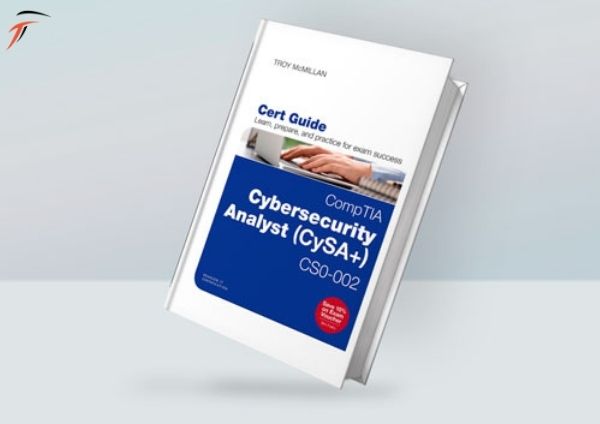معرفی کتاب CompTIA Cybersecurity Analyst (CySA+) CS0-002 Cert Guide, 2nd Edition

با سلام خدمت همراهان همیشگی فرکیان تک. با شما هستیم با کتاب Cybersecurity Analyst . این کتاب بر مفاهیم امنیت سایبری تمرکز کرده است.
وضعیت کلی امنیت از طریق شناسایی و مبارزه با بدافزار و تهدیدهای مداوم پیشرفته (APTs) تجزیه و تحلیل رفتاری را در شبکهها اعمال میکند و در نتیجه باعث افزایش دید تهدید در سطح حمله گسترده میشود. این توانایی یک متخصص IT را برای دفاع فعالانه و بهبود مستمر امنیت سازمان تأیید میکند. CySA+ تأیید میکند که داوطلب موفق از دانش و مهارت لازم برای:
استفاده از هوش و تکنیکهای تشخیص تهدید
تجزیه و تحلیل و تفسیر دادهها
شناسایی و برطرفسازی آسیبپذیریها
پیشنهاد اقدامات پیشگیرانه
پاسخ و برطرف کردن حوادث به صورت مؤثر
CompTIA CySA + دارای استاندارد ISO 17024 است و توسط وزارت دفاع ایالات متحده تأیید میباشد تا الزامات راهنمای 8570.01-M را برآورده کند. مطابق با مقررات دولت تحت قانون مدیریت امنیت اطلاعات فدرال (FISMA) است. رگولاتورها و دولت به اعتبار ANSI اعتماد میکنند، زیرا به آنها حصول اطمینان را در نتایج یک برنامه معتبر فراهم میکند. از 1 ژانویه 2011 بیش از 2.3 میلیون آزمون معتبر CompTIA ISO / ANSI تحویل داده شده است.
محتوا دوره :
1. اهمیت داده ها و اطلاعات تهدید
2. استفاده از اطلاعات تهدید برای حمایت از امنیت سازمانی
3. فعالیت های مدیریت آسیب پذیری
4. تجزیه و تحلیل خروجی ارزیابی
5. تهدیدات و آسیب پذیری های مرتبط با فناوری تخصصی
6. تهدیدات و آسیب پذیری های مرتبط با عملیات در فضای ابری
7. پیاده سازی کنترل ها برای کاهش حملات و آسیب پذیری های نرم افزار
8. راه حل های امنیتی برای مدیریت زیرساخت
9. بهترین روش های تضمین نرم افزار
10. بهترین روش های تضمین سخت افزار
11. تجزیه و تحلیل داده ها به عنوان بخشی از فعالیت های نظارت بر امنیت
12. اجرای تغییرات پیکربندی در کنترل های موجود برای بهبود امنیت
13. اهمیت شکار پیشگیرانه تهدید
14. مفاهیم و فناوری های اتوماسیون
15. فرآیند واکنش به حادثه
16. اعمال روش مناسب واکنش به حادثه
17. تجزیه و تحلیل شاخص های بالقوه سازش
18. استفاده از تکنیک های پایه پزشکی قانونی دیجیتال
19. اهمیت حفظ حریم خصوصی و حفاظت از داده ها
20. بکارگیری مفاهیم امنیتی در حمایت از کاهش ریسک سازمانی
21. اهمیت چارچوب ها، سیاست ها، رویه ها و کنترل ها
22. آماده سازی نهایی
با ما همراه باشید.
Book Description
CompTIA Cybersecurity Analyst (CySA+) CS0-002 Cert Guide is a best-of-breed exam study guide. Expert technology instructor and certification author Troy McMillan shares preparation hints and test-taking tips, helping you identify areas of weakness and improve both your conceptual knowledge and hands-on skills. Material is presented in a concise manner, focusing on increasing your understanding and retention of exam topics.
The book presents you with an organized test-preparation routine through the use of proven series elements and techniques. Exam topic lists make referencing easy. Chapter-ending Exam Preparation Tasks help you drill on key concepts you must know thoroughly. Review questions help you assess your knowledge, and a final preparation chapter guides you through tools and resources to help you craft your final study plan.
The companion website contains the powerful Pearson Test Prep practice test software, complete with hundreds of exam-realistic questions. The assessment engine offers you a wealth of customization options and reporting features, laying out a complete assessment of your knowledge to help you focus your study where it is needed most.
Well regarded for its level of detail, assessment features, and challenging review questions and exercises, this CompTIA approved study guide helps you master the concepts and techniques that will enable you to succeed on the exam the first time.
Content
1. The Importance of Threat Data and Intelligence
2. Utilizing Threat Intelligence to Support Organizational Security
3. Vulnerability Management Activities
4. Analyzing Assessment Output
5. Threats and Vulnerabilities Associated with Specialized Technology
6. Threats and Vulnerabilities Associated with Operating in the Cloud
7. Implementing Controls to Mitigate Attacks and Software Vulnerabilities
8. Security Solutions for Infrastructure Management
9. Software Assurance Best Practices
10. Hardware Assurance Best Practices
11. Analyzing Data as Part of Security Monitoring Activities
12. Implementing Configuration Changes to Existing Controls to Improve Security
13. The Importance of Proactive Threat Hunting
14. Automation Concepts and Technologies
15. The Incident Response Process
16. Applying the Appropriate Incident Response Procedure
17. Analyzing Potential Indicators of Compromise
18. Utilizing Basic Digital Forensics Techniques
19. The Importance of Data Privacy and Protection
20. Applying Security Concepts in Support of Organizational Risk Mitigation
21. The Importance of Frameworks, Policies, Procedures, and Controls
22. Final Preparation
